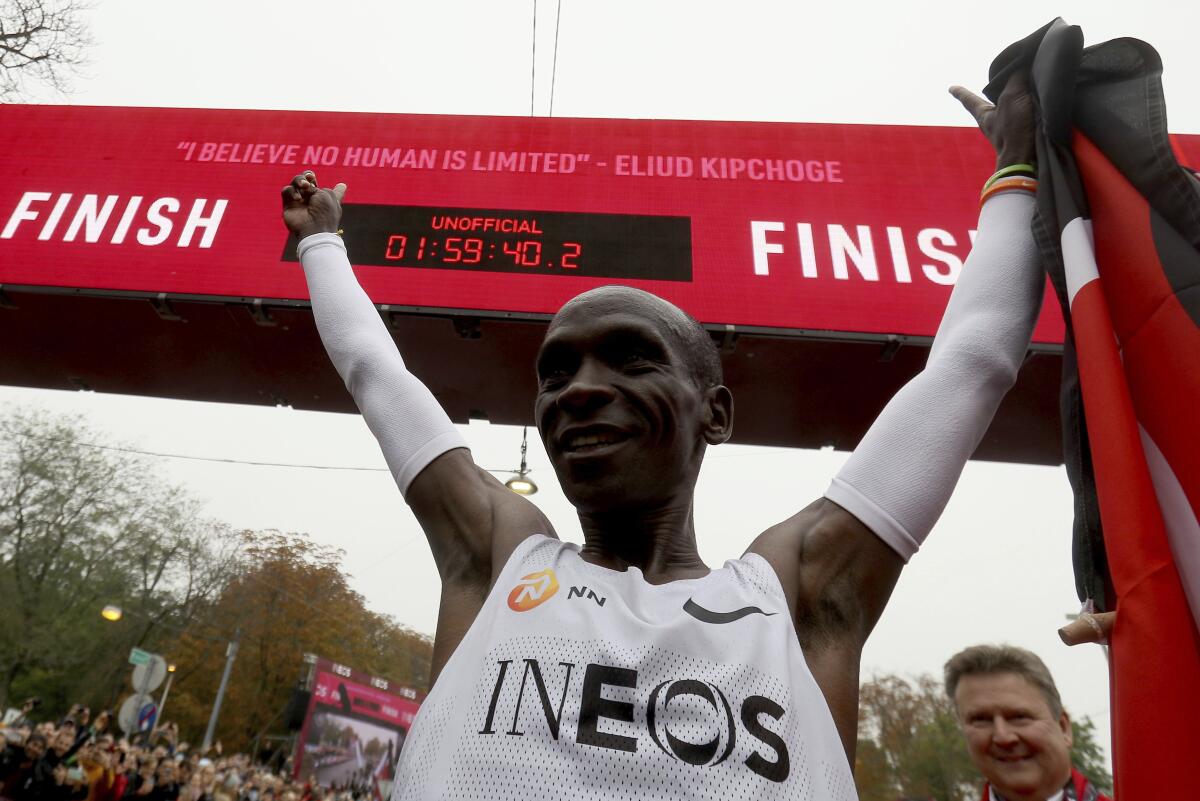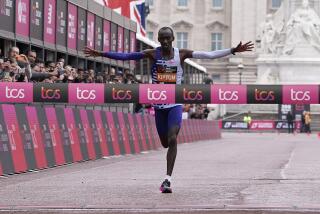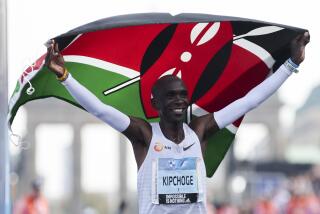Eliud Kipchoge breaks two-hour barrier in marathon

- Share via
Eliud Kipchoge sent shockwaves through the world of sport by becoming the first athlete to break the two-hour barrier for a marathon, although it will not count as a record.
The Olympic champion and world record holder from Kenya clocked 1 hour, 59 minutes and 40.2 seconds at the INEOS 1:59 Challenge on Saturday, an event set up for the attempt.
Kipchoge, who compared his attempt earlier to a man landing on the moon, twice punched his chest in celebration and smiled when he finished.
“That was the best moment of my life,” he said before adding that he trained four-and-a-half months for his extraordinary race against the clock. ”The pressure was very big on my shoulders. I got a phone call from the President of Kenya.”
Starting at 8:15 a.m., Kipchoge was supported by 36 pacemakers who accompanied him in alternating groups, one of the reasons the IAAF governing body will not ratify the time as a world record.
The groups were also helped by a pace car with a laser beam, projecting the ideal position on the road, and they received drinks handed over by cyclists and other runners to prevent them from having to slow down.
“It is a great feeling to make history in sport after Sir Roger Bannister,” Kipchoge said in reference to the late Briton’s first sub four-minute mile in 1954. ”I am the happiest man in the world to be the first human to run under two hours and I can tell people that no human is limited. I expect more people all over the world to run under two hours after today.”
Kipchoge pointed out his mission went beyond athletics.
“We can make this world a beautiful world and a peaceful world,” he said. ”The positivity of sport. I want to make it a clean sport and an interesting sport.”
Sign up for our free sports newsletter >>
Kipchoge was cheered by spectators along the course in Prater Park and there were celebrations in his home country before he had even finished.
“Hearty congratulations, Eliud Kipchoge,” President Uhuru Kenyatta said in a statement. ”You’ve done it, you’ve made history and made Kenya proud. Your win today will inspire future generations to dream big and aspire to greatness. We celebrate you and wish you God’s blessings.”
Hundreds of joyous Kenyans brought traffic to a standstill in the middle of the capital, Nairobi, as they gathered to watch the end of the run on a large screen. People pumped their fists, clapped and fell to their knees as Kipchoge cruised to the finish line.
In Kenya’s running mecca of Eldoret, called the home of champions, hundreds of people burst on to the streets in celebration.
“We should line up the entire road from the airport to Nairobi. Receive him like the hero he is,” prominent activist Boniface Mwangi said on Twitter.
Running at an average pace of 2:50 minutes per kilometer (4:33.5 minutes per mile), Kipchoge was 11 seconds ahead of schedule halfway through his run. He then maintained his tempo until the pacemakers left him for the final 500 meters, where he sped up.
”I was really calm, I was just trying to maintain the pace,” said Kipchoge, adding he was never in doubt about breaking the barrier. “For me it was not 50-50, it was 90 percent.”
More to Read
Go beyond the scoreboard
Get the latest on L.A.'s teams in the daily Sports Report newsletter.
You may occasionally receive promotional content from the Los Angeles Times.










